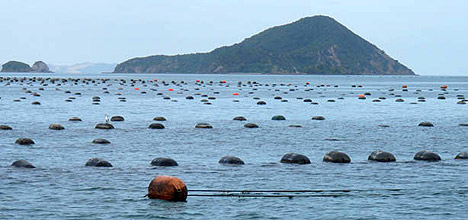The open ocean nutrients that feed the pongy sea lettuce in Tauranga harbour do have a benefit; they will feed the new aquaculture industry in Opotiki waters.
The nutrient rich waters of the Bay of Plenty are great for feeding shellfish farms, says Opotiki District Council chief executive Aileen Lawrie, and aquaculture is a big part of the council's vision for the future.
'As far as we are concerned, aquaculture is the future of the Eastern Bay,” says Aileen.
The council has an Opotiki harbour transformation project that incorporates the Eastern Seafarms aquaculture venture – the country's largest offshore marine farm, and a large scale infrastructure project to improve the navigability of the Opotiki harbour entrance.
'Our role is to provide an all-weather access to the harbour to enable aquaculture.”
Aileen says there is 3800 hectares permitted for Eastern Seafarms to develop in stages.
The first stage includes putting down lines to use for research, which started in October 2010, and Aileen says they are already showing good growth on them.
The announcement this week of $107 million from government-industry funding of Primary Growth Partnership proposals was welcomed by the Whakatohea Maori Trust Board.
The board is the majority shareholder of the Eastern Seafarms aquaculture venture.
General manager Dickie Farrar says the news of more funding into the aquaculture industry is exciting.
'That's fantastic they are putting more funding towards aquaculture development.
'If there is funding available that would be great.”
Dickie says they are working closely with Aquaculture New Zealand and are still doing a lot of research and development.
She says they were concerned about the recent stormy weather hitting the coast and damaging the lines.
'We have about 2kms of lines down. The good news is they held up.
'We had a boat out to pull up the lines to look at the growth, and the results are looking promising.”



4 comments
misleading title
Posted on 06-02-2011 11:47 | By claypole
Farmed fish are carnivores so sea lettuce good for fish farms?, back to school!. It takes 3 kilo of feed (processed fish protein and antibiotic pellets) to produce 1 kilo of product, you give me $3 and i'll give you $1). Aquaculture is a source of economic opportunity for a few and an environmental plague for the planet (National Geographic re Chilean Patagonia coast) effecting ocean ecosystems Aquaculture creates pollution and the huge area the government are allowing for financial gain, is completely off limits to the public, no access which sounds like privatising parts of the foreshore and seabed. Isnt the F&S owned by us all (crown) at present?
misread article, if at all?
Posted on 06-02-2011 17:01 | By The author of this comment has been removed.
The article is about shellfish farms, NOT Carniverous fish Claypole, did you even read the article????
does
Posted on 07-02-2011 00:20 | By Capt_Kaveman
this mean that the nutrient rich ships will keep spilling it into the harbour
derrrr!
Posted on 07-02-2011 11:43 | By claypole
Xenasdead, if you read my comments. it highlights facts about aquaculture and yes, shellfish farms cause destruction of ecosystems, pollution and block off access to the public as well!
Leave a Comment
You must be logged in to make a comment.